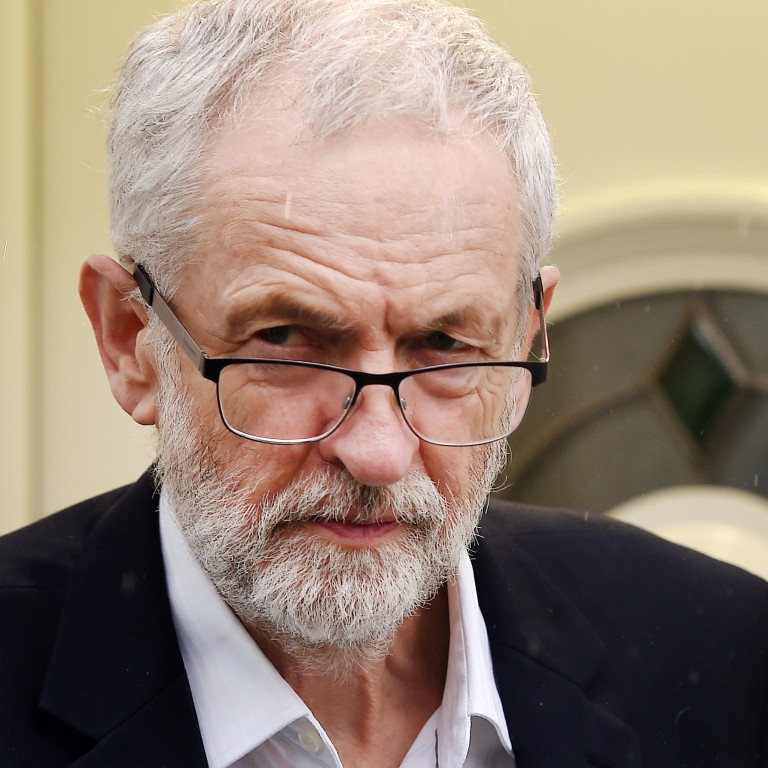
Jeremy Corbyn: Britain’s saviour or great white nope?
- Electoral support fades for UK opposition leader amid disillusionment over his failure to oppose Brexit
The former UK prime minister Theresa May ended her final parliamentary address last month with a rebuke, not to her fellow Conservatives that had made her life so difficult she had to resign, but to the Labour leader Jeremy Corbyn.
“As a party leader who has accepted when her time has come, perhaps the time has come for him to do the same,” May said.
With a hung parliament bitterly divided over Brexit the prospect of a snap election in the autumn appears closer by the day. Critics say the leader of the UK opposition is missing in action, unelectable and whose insistence on clinging on to power is threatening the very existence of the Labour Party.
“British politics is constipated and the only positive laxative would be a new leader of the Labour Party,” said anti-Brexit radio presenter James O’Brien last week.
O’Brien, a popular figure especially with London’s liberal elite, made his comments after a by-election in the Welsh constituency of Brecon and Radnorshire saw the Conservative Party losing a former safe seat to the staunchly anti-Brexit Liberal Democrats.
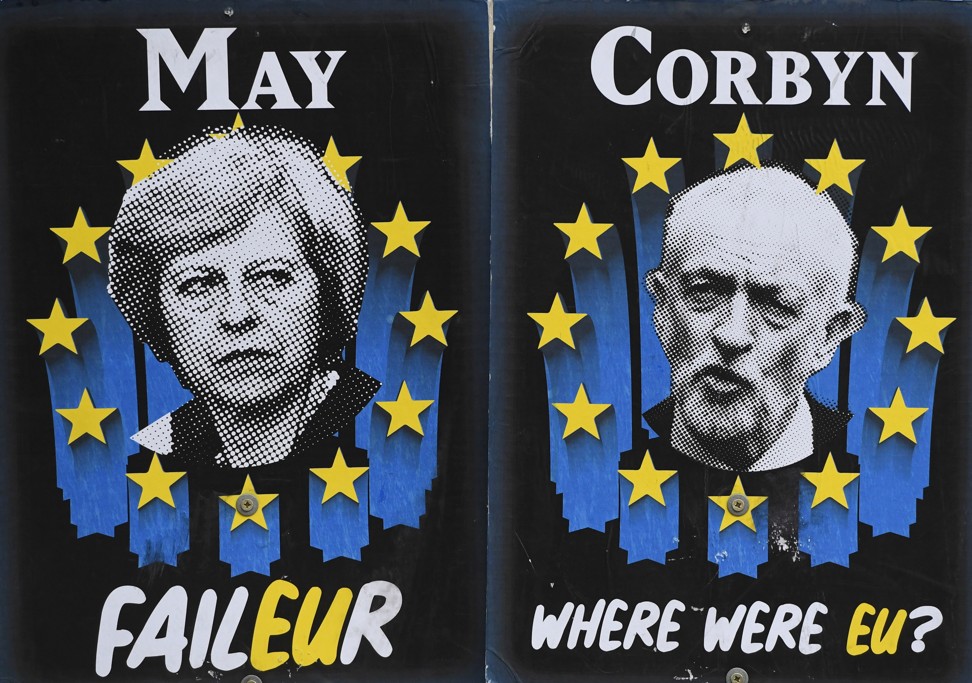
The Labour candidate, beset by the unpopularity of its leader with voters, if not party members, scored just 5.28 per cent of the vote – nearly losing his deposit.
In normal times, after 10 years of a Conservative government, the Labour Party should be forging ahead.
Johnson has promised a “do or die” determination to take the UK out of the EU even if severe damage is inflicted on the economy.
New British PM Boris Johnson’s ruthless purge of enemies before moving into No 10 Downing St
Various opinion polls since Johnson came to power on July 23 put Labour at between 20 and 28 per cent of the vote – a long way from electoral victory.
For centrists in the party, the fault lies with the party’s 70-year-old left-wing leader, Corbyn.
Brexit has driven a truck through both the main UK political parties, with strong support for leaving the European Union in Labour’s northern heartlands.
Johnson, in power thanks to just 66,000 Conservative Party members who voted for him as leader, is already in full campaign mode.
He has promised to reverse 10 years of economic austerity, making rash spending promises for vital services like the police and the National Health Service as well as infrastructure investment.
The response so far by Labour, and Corbyn in particular, seems woefully inadequate.
Once seen almost as a messiah figure by young people, Corbyn, a dour vegetarian who doesn’t like swearing or alcohol, has seen his early electoral support fade amid disillusion over his failure to oppose Brexit.
Jeremy Corbyn denies calling PM Theresa May a ‘stupid woman’
In 2017, he then confounded his critics with a stunning performance during May’s snap election, when Labour seized 30 seats and gained 40 per cent of the vote.
Since then, however, his personal ratings have been on the slide as the party has struggled to articulate to the general public its policy on Brexit.
Labour picked up just 14 per cent of the vote in May’s European elections, losing heavily to the pro-Remain Liberal Democrats.
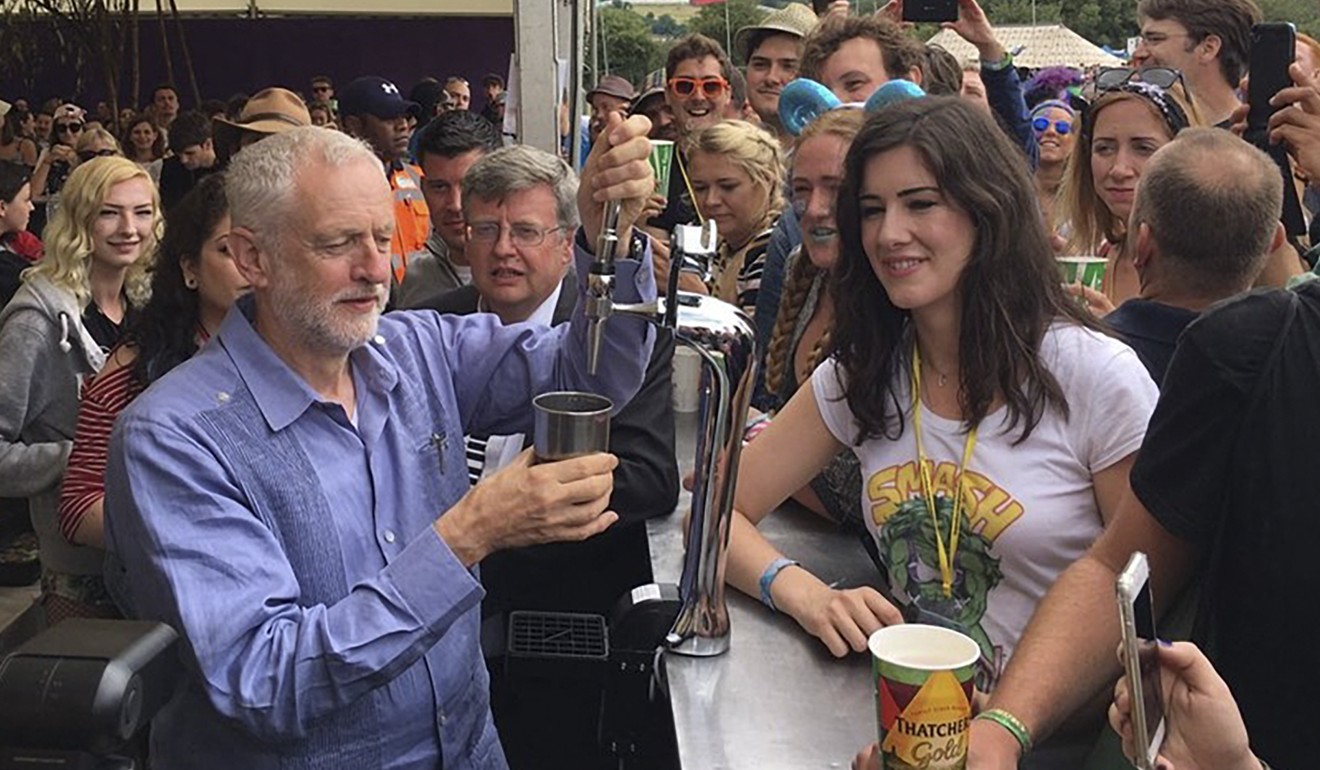
With many Labour constituencies having voted Brexit in the last election, Corbyn, who says he voted Remain but who opposed the EU in the past for anti-capitalist reasons, has spent the best part of the last three years sitting on the fence.
Only now, with the Liberal Democrats creaming off the Labour vote has the party formulated a policy to support a second referendum – but only in the event of a no-deal Brexit.
Critics say Corbyn is stuck in left-wing student politics of the 1970s and 80s and is unable to take the party forward.
“Jeremy Corbyn has dug the party deeper and deeper into a huge hole of his own making – one it won’t climb out of until it dumps him,” said Tim Bale, professor of politics at Queen Mary, University of London.
“Given how much the membership still seems to love him come what may, that doesn’t look likely to happen any time soon – by which time it will be way too late. Indeed, I’d say the party’s very survival is open to question if it carries on like this.”
Labour leader Jeremy Corbyn’s plug for Marx not enough to win Beijing over
Last week Alistair Campbell, the former Labour prime minister Tony Blair’s spin doctor, received considerable press coverage after he said he wouldn’t be rejoining the party.
Campbell was expelled from the party after he said on television he would vote Liberal Democrats in the June European elections.
“It’s gone beyond who’s up and who’s down inside the Labour Party,” Campbell told Sky News.
“I think the country is facing a moment of absolute peril. I think we’ve now got this ill-qualified, ill-intentioned populist right-wing leader whose become leader with a different set of lies to the lies he told to win the referendum and Labour, they are not remotely in a winning position.”
He said Corbyn was “just not rising to the challenge, and we have to stop pretending that somehow it’s all going to be fine on the night because its not unless there is major radical change.”
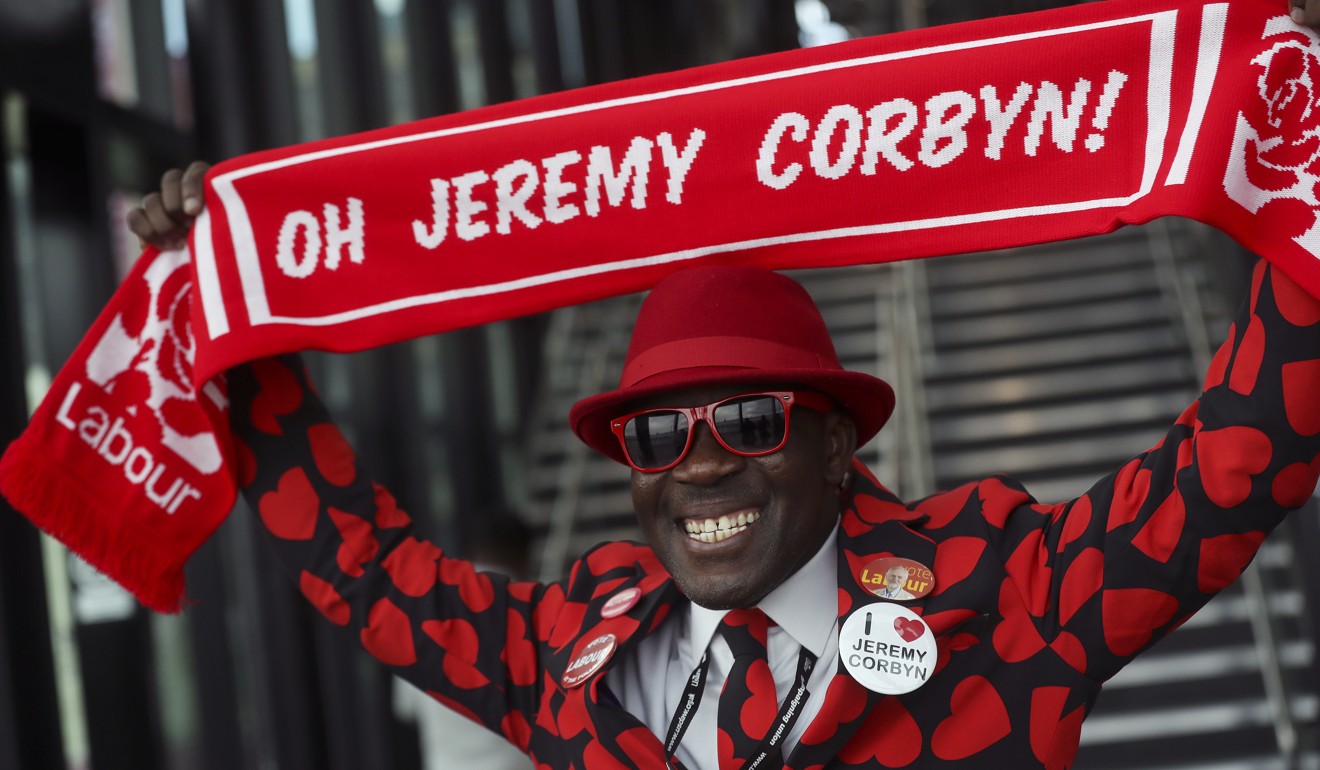
Campbell pointed out that there have been more prime ministers from Eton (Johnson is an old Etonian) than there have been Labour governments, a sign of how difficult it is in the UK for Labour to actually win.
The privately educated Corbyn, who grew up in a Georgian manor house in the Midlands, has said his politics were shaped when he went to work as a volunteer in Jamaica in the period immediately after the Caribbean island’s independence.
He has also long been a supporter of the Palestinian cause in the Middle East.
Corbyn has been blamed for allowing the hatreds of the Middle East to seep into the body politic of Labour.
Punk icon Vivienne Westwood hails ‘wonderful’ Corbyn at London Men’s Fashion Week
A BBC documentary recently screened showing many Jewish party members who claimed they have been the subjects of racial abuse from within the party.
Instead of taking swift and decisive action, Corbyn complained the show was biased.
“I was upset at the feelings of some of our former staff, what they said,” Corbyn said in a television interview last week.
“I was upset at the way the programme was characterised and presented, and we have put in some complaints surrounding that.”
Tony Travers, a politics professor at the London School of Economics, said: “From the beginning, Jeremy Corbyn wasn’t supported by the majority of MPs in parliament – the reason his politics are to the left of the bulk of the parliamentary party.
“Those who surround him in the leader’s office have control of the machine and they hope via normal means Jeremy Corbyn will become PM and they can deliver a more radical left-wing programme.”
Corbyn’s inner circle include former journalist Seamus Milne, the hard-left head of his communications team, who despite his posh Winchester College and then Oxford University education (his father Alasdair Milne had been the director general of the BBC) has close links with Russia.
Andrew Fisher, the man said to have written Labour’s manifesto, was once suspended from Labour after backing the anarchist group Class War.
The shadow chancellor John McDonnell is also unashamedly Marxist.
UK Labour leader Jeremy Corbyn supports second Brexit referendum, bowing to party pressure
“If you look at the two main parties at the moment, one has been captured by the forces of Brexit, one has been captured by the forces of the hard left and a pretty nasty hard left at that, and in the middle millions of people saying who do I support out of this? Something has to give and something is going to give,” Campbell said.
“This is unsustainable for a country as important as ours.”
Corbyn, instinctively hostile to the media, has spent most of his time since Johnson’s election talking to constituents rather than making himself visible through the media to the mass electorate.
He did a TV interview just over a week ago where he said he was not worried about facing Johnson in an election “in the slightest”.
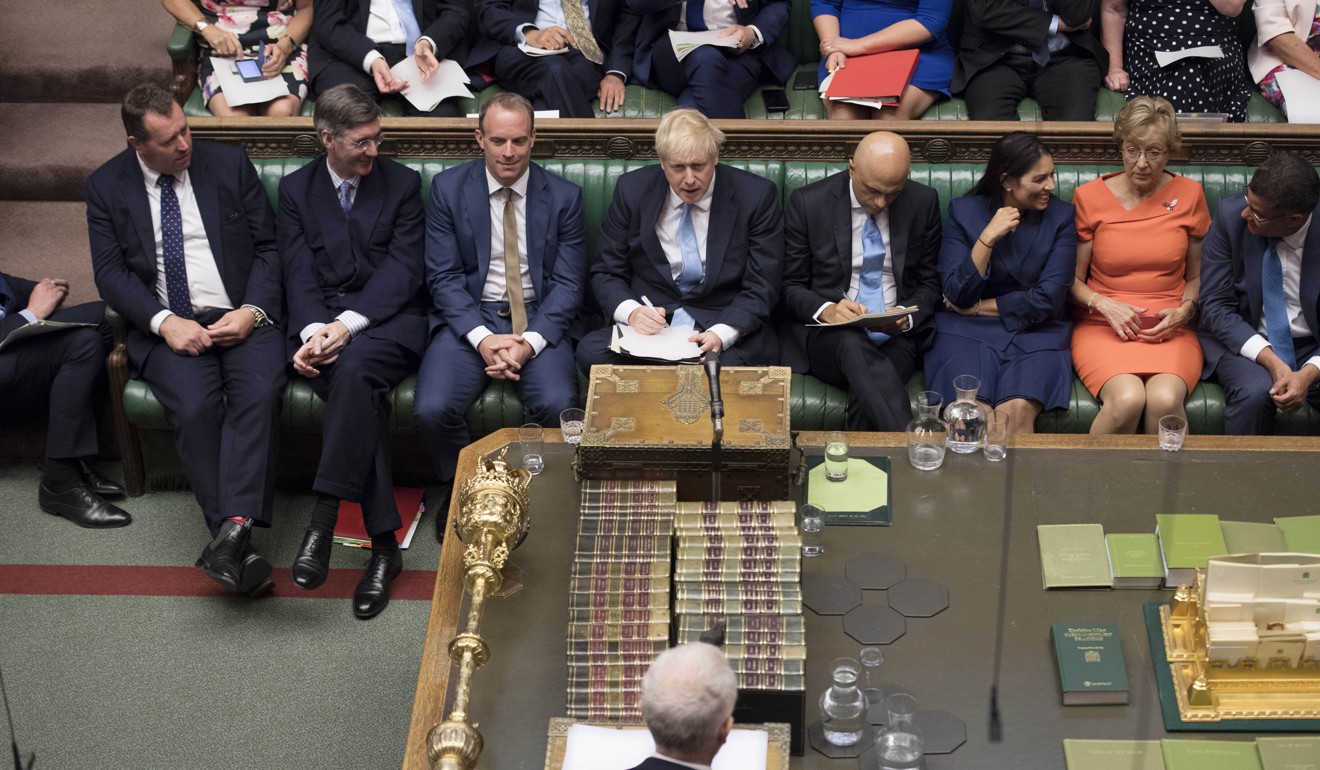
“We’ll go out there and we’ll make our case. I don’t get involved in personal abuse; I don’t make any personal abuse,” he said.
Corbyn’s criticism of the huge economic inequalities in the UK, a strong opposition to US President Donald Trump, plus his past opposition to the Iraq War as leader of the Stop the War coalition, resonate with many.
He still has more than twice the number of followers on Twitter than the new prime minister.
But if he going to have any chance in winning an election, Corbyn will have to appeal to the broader Labour church and pick up middle-of-the-road voters if he is to save the party from oblivion.
He will also need to take on the eloquent and witty Johnson in parliamentary debates, and may sometimes need to get personal.

